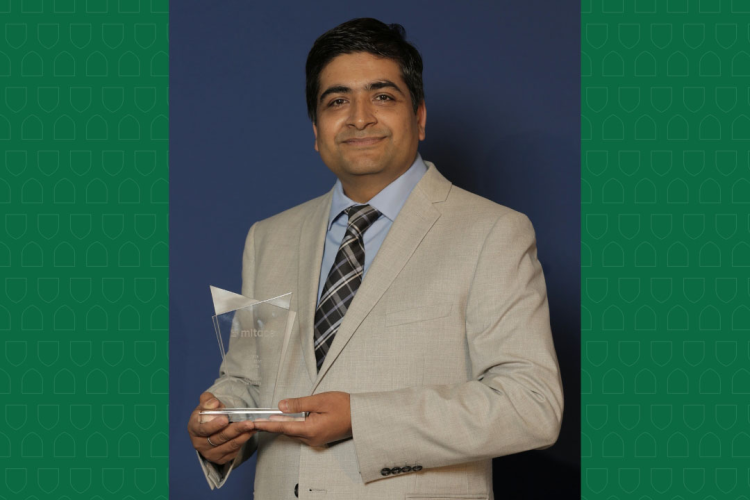
Dr. Bishnu Acharya (PhD) has been awarded the prestigious Mitacs Innovation Award. (Photo: Submitted)
The University of Saskatchewan's (USask) Dr. Bishnu Acharya (PhD) has been awarded the prestigious Mitacs Innovation Award, for his research into turning canola, oat and flax waste into feed for microbes, nutritional food additives and sustainable packaging.
As Saskatchewan moves towards its goal of increasing canola crushing by 75 per cent by 2023 helping to fuel the province's record-breaking international export of canola oil Acharya is being recognized for his cutting edge solutions to an emerging problem: what can we do with all of the canola meal that is left over after the oil extraction?
Acharya, the Saskatchewan Ministry of Agriculture Endowed Research Chair in Bioprocess Engineering and associate professor of chemical and biological engineering in USask's College of Engineering, is leading a research effort to turn canola meal into a low-cost, nutrient dense feed for microbes to use in fermentation. This fast-growing segment of the biotechnology sector benefits the development of new foods, beverages, medicines and other applications.
His innovative work with canola meal is one of several cutting-edge projects that earned Acharya a Mitacs Innovation Award Outstanding Research Leadership, on November 19, 2024, presented by Mitacs, a Canadian innovation leader. Supported by the Government of Saskatchewan, Mitacs connects businesses and researchers to drive competitiveness and productivity in sectors such as agriculture, life sciences, biomass, energy and mining.
The award honours post-secondary supervisors with an exemplary record of developing collaborations with enterprise partners, providing valuable research and training experiences to their interns, and utilizing Mitacs funding to initiate groundbreaking research. During the award ceremony at the National Arts Centre in Ottawa, Acharya was recognized for his outstanding effort in bringing together industry and researchers to collaborate on finding the value in waste and connecting it to practical applications.
"There's a big push to move away from a fossil fuel-based economy towards a bio-based economy as a means to mitigate climate change and global warming," Acharya said. "Our work focuses on innovating new processes and products that will be crucial for this transition to work."
In one instance, Archarya's work alongside a Mitacs-funded PhD student to find an environmentally friendly application for canola meal led to the spinoff of the Saskatoon-based CanXtract Innovation Inc., which is now poised to help reduce operating costs of companies focused on fermentation while adding value to canola oil producers.
Acharya is also collaborating with industry partner Richardson Milling Inc., one of the world's largest oat millers, to generate value from oat hulls.
When grains are processed into food products, only 75 per cent of the grain is used, he explained. The remaining 25 per cent is comprised of hulls that are typically disposed of at a cost to the producer.
In a Mitacs-funded pilot project at USask, Acharya's research group successfully demonstrated that these hulls in fact contain quality sugar and fibre that can be used as food additives to enhance the functional and nutritional value of common baked goods and other food items. The team also isolated cellulose from the fibre for use as a binding agent to develop more sustainable food packaging containers.
"Whereas other research efforts are focused on burning oat hulls to generate heat as an energy source, we discovered much higher value bioproducts in the form of sugar, lignin and cellulose," Acharya said.
Acharya emphasized that none of this research would be possible without the support of Mitacs and partner organizations like the Natural Sciences and Engineering Research Council of Canada (NSERC).
"The best part about Mitacs-funded collaborations is that industry becomes more aware of what's happening at the leading edge and students get an opportunity to understand the workplace," Acharya said, calling the industry experience invaluable to his students.
"It changes our perspective as to how to carry out our research because we're constantly thinking about how that research can be implemented in industry."
To learn more about Acharya's research journey and award, watch https://www.youtube.com/watch?v=eAVLFkv5eC4
For more information about the Mitacs Innovation Awards and a full list of winners, visit www.mitacs.ca/newsroom.












